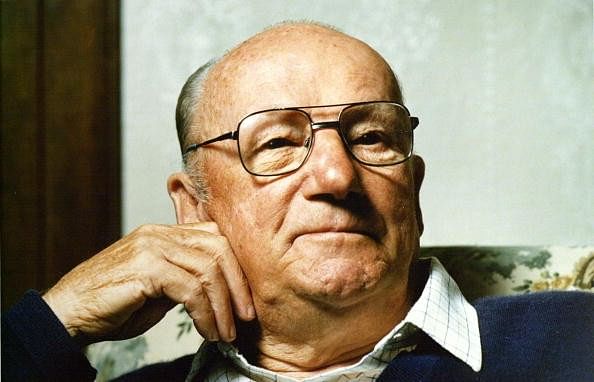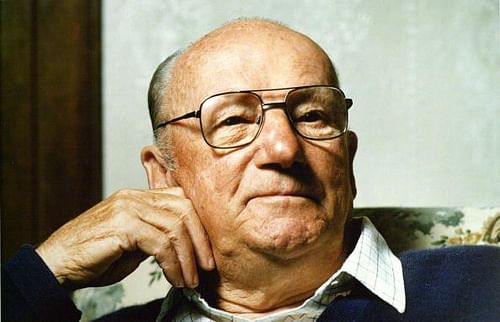
10 reasons why no batsman will ever come close to Sir Donald Bradman

“There was no one like him and I don’t think anyone will be,” Sir Alec Bedser said of Sir Donald Bradman. Arguably the greatest cricketer of all time, The Don was born on this day 107 years ago and the rest, as they say, is history. More than 66 years since his retirement and 14 years after his death, the records that Bradman still has to his name are innumerable.
Much like his iconic status, his Test batting average of 99.94 is one of cricket’s most famous statistics. In fact, his average remained above 50 since just his third innings.
Bradman’s career is the stuff of legends. The numbers are just staggering – no wonder his favourite subject was Mathematics. His genius was unmatched by any of his peers and all these years down the line, no other batsman has come close to matching his cricketing records.
So what made Bradman truly special? Here are 10 reasons why no batsman will ever come to matching his achievements.
1. Bradman’s batting average – 99.94. The best after that? 60.97
99.94 is cricket’s most powerful number and one of the first statistics which fans new to the game readily picks up. The Don scored 6996 runs from just 52 Test matches and 80 Test innings. he remained unbeaten on ten occasions putting his average at 99.94, by far the best for any batsman.
Bradman’s average is 64% better than the second-best of 60.97 achieved by South Africa’s Graeme Pollock which pales in comparison to the Australian’s incredible number.
| No | Player | Batting average |
| 1 | Sir Donald Bradman | 99.94 |
| 2 | Graeme Pollock | 60.97 |
| 3 | George Headley | 60.83 |
| 4 | Herbert Sutcliffe | 60.73 |
| 5 | Eddie Paynter | 59.23 |
| 6 | Ken Barrington | 58.67 |
| 7 | Everton Weekes | 58.61 |
| 8 | Wally Hammond | 58.45 |
| 9 | Garfield Sobers | 57.78 |
| 10 | Jack Hobbs | 56.94 |
That he would have achieved a magical average of exactly 100 had he scored just four runs in his final innings is part of cricketing folklore.
2. Fastest to all the 1000-run milestones that Bradman completed.
Bradman is the quickest to reach all the 1000-run milestones that he completed in Test cricket in terms of matches and only missed out on the 1000 run mark by an innings to Herbert Sutcliffe. The gap just kept widening as the runs kept increasing as seen in the table below.
| Milestone | Matches | Innings | Matches | Innings |
| Bradman | Nearest Competitor | |||
| 1000 runs | 7 | 13 | 9 | 12 |
| 2000 runs | 15 | 22 | 17 | 32 |
| 3000 runs | 23 | 33 | 31 | 51 |
| 4000 runs | 31 | 48 | 43 | 68 |
| 5000 runs | 36 | 56 | 55 | 91 |
| 6000 runs | 45 | 68 | 65 | 111 |
3. 29 centuries in 52 Tests
Bradman scored an astonishing 29 Test centuries in 52 matches or 80 innings at a ratio of 36.25%, which means he scored a century every three innings he played. Here is the look at the full table of players with the lowest innings/century ratio in Tests.
| No | Player | Innings | Centuries | Ratio |
| 1 | Don Bradman | 80 | 29 | 2.75 |
| 2 | George Headley | 40 | 10 | 4 |
| 3 | Clyde Walcott | 74 | 15 | 4.93 |
| 4 | Herbert Sutcliffe | 84 | 16 | 5.25 |
| 5 | Everton Weekes | 81 | 15 | 5.40 |
4. Most double centuries in Test cricket (12)
Bradman holds the record for the highest number of double centuries (12) in Test cricket. Understandably it is also the highest ratio of double centuries per innings played - 15.0% (12 double centuries from 80 innings)
| No | Player | Innings | 200s | Ratio |
| 1 | Donald Bradman | 80 | 12 | 0.15 |
| 2 | Kumar Sangakkara | 233 | 11 | 0.05 |
| 3 | Brian Lara | 232 | 9 | 0.04 |
| 4 | Wally Hammond | 140 | 7 | 0.05 |
| 5 | Mahela Jayawardene | 252 | 7 | 0.03 |
5. Highest conversion rate of 50 plus scores into 100s
Bradman often used to make the starts count and was in the habit of scoring big hundreds. His 50 to 100 conversion rate is 2.23 which is more than double his nearest competitor.
| No | Player | Matches | 100s | 50s | Ratio |
| 1 | Donald Bradman | 52 | 29 | 13 | 2.23 |
| 2 | Mohammad Azharuddin | 99 | 22 | 21 | 1.05 |
| 3 | Matthew Hayden | 103 | 30 | 29 | 1.03 |
| 4 | Virender Sehwag | 79 | 21 | 22 | 0.95 |
| 5 | Wally Hammond | 85 | 22 | 24 | 0.92 |
6. Most runs in a single day’s play
The pace with which runs are scored these days in Test cricket is much more than what it used to be in the days of Bradman. Despite the advent of ODI and T20 cricket that has produced so many swashbuckling batsmen, it is batsmen who hold the record for scoring the most number of runs in a single day’s play.
He features another time in the Top 5 list and once more in the Top 10 list.
| No | Player | Runs | Opposition | Year |
| 1 | Donald Bradman | 309 | England | 1930 |
| 2 | Wally Hammond | 295 | New Zealand | 1933 |
| 3 | Virender Sehwag | 284 | Sri Lanka | 2009 |
| 4 | Dennis Crompton | 273 | Pakistan | 1954 |
| 5 | Donald Bradman | 271 | Australia | 1934 |
7. Most runs in a Test series
The Ashes provides England and Australian batsmen with a better opportunity than most other players to feature in the most runs in a series list, but even the its the Don who tops the list this time as well. He scored 974 runs in just 7 innings at an average of 139.14 during the 1936/37 home Ashes series and features in the Top 10 on a couple of other occasions.
| No | Player | Matches | Innings | Opposition | Average |
| 1 | Donald Bradman | 5 | 7 | 974 | 139.14 |
| 2 | Wally Hammond | 5 | 9 | 905 | 113.12 |
| 3 | Mark Taylor | 6 | 11 | 839 | 83.90 |
| 4 | Neil Harvey | 5 | 9 | 834 | 92.66 |
| 5 | Vivian Richards | 4 | 7 | 829 | 118.42 |
Bradman is also on top when it comes to a team’s captain who has scored most runs in a series with 810 runs.
8. Most Test runs against a single opponent
Again, The Ashes contributes to this Bradman record as well with a majority of his Test matches coming against England. He scored 5028 runs against the fierce rivals in 63 innings at an average of 89.78. In fact, no other batsman has scored more than 3000 Test runs against a single opposition.
9. Bradman was never dismissed ‘stumped’ nor did he lose his wicket while batting in the 90s
Bradman had many super qualities but none more than his concentration and ability to maintain his cool. He was never dismissed ‘stumped’ in his entire career nor did he get out while batting in the 90s.
10. Statistics prove that Bradman is the greatest sportsperson of all time
Statistics proved that Bradman dominated his sport like no other. In 2000, Charles Davis conducted a detailed analysis of the performance of the various elite sportsmen by comparing the number of standard deviations they stand above the mean in their respective sports, as reported by Quora. The results showed that Bradman was not just the greatest cricketer of all time, but the greatest amongst any sportsmen in the way he dominated his peers and successors.
| No | Athlete | Sport | Statistic | Standard Deviation |
| 1 | Donald Bradman | Cricket | Batting average | 4.4 |
| 2 | Pele | Football | Goals per game | 3.7 |
| 3 | Ty Cobb | Baseball | Batting average | 3.6 |
| 4 | Jack Nicklaus | Golf | Major titles | 3.5 |
| 5 | Michael Jordan | Basketball | Points per game | 3.4 |